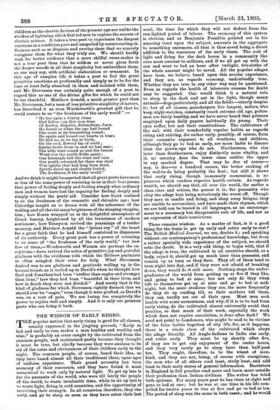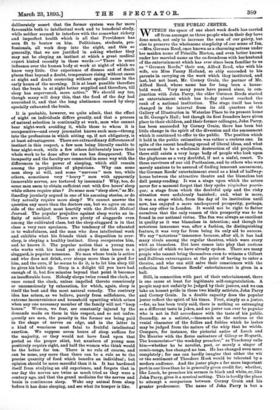THE WISDOM OF EARLY RISING.
meal, the time for which they will not deduct from the sun-lighted period of labour. The economy of this system
is obvious, and as Benjamin Franklin pointed out in his amusing tract upon the subject, amounts in the aggregate to something enormous, all that is thus saved being a direct addition to the resources of the early risers. The cost of light and firing for the dark hours in a community like ours must amount to millions, and if we all got up with the sun and went to bed an hour after twilight, five-sixths of the whole amount might be saved. All the popular adages have been, we believe, based upon this secular experience, and they are, as regards economy, undoubtedly true. Whether they are true in any other way may be questioned. Even as regards the health of labourers reasons for doubt may be suggested. One would think it a natural rule to sleep in the dark and not in the light, though many
animals—dogs particularly, and all the felidie despise it; but of all classes, gamekeepers live longest, sailors, who keep night-watches, constantly reach extreme old age, police- men are fairly healthy, and we have never heard that printers employed upon daily papers habitually die young. Their eyes suffer, but not their constitutions. The cultivators of the soil, with their wonderfully regular habits as regards rising and retiring, die rather early, possibly, of course, from their excessive exposure to all weathers ; and children, although they go to bed so early, are more liable to disease than the grown-ups who do not. Northerners, who rise later than Southerners, enjoy distinctly more vitality, and in no country does the lower class outlive the upper in any marked degree. That may be due of course— nay, is due—to a hundred causes, the better cooking of the well-to-do being probably the first ; but still it shows that early rising, though immensely economical, is no panacea which renders superior health certain. As regards wealth, we should say that, all over the world, the earlier a class rises and retires, the poorer it is ; the peasantry who obey the adage best being notoriously the worst off. Though they save in candle and firing, and sleep away fatigue, they are unable to accumulate, and have made their rhymes, which we are told can be traced in all languages, as an encourage- ment to a necessary but disagreeable rule of life, and not as an expression of their convictions.
There remains wisdom. As a matter of fact, is it a good thing for the brain to get up early and retire early to rest P The British Medical Journal, we see, doubts it ; and speaking without our contemporary's professional knowledge, but from a rather specially wide experience of the subject, we should echo the doubt. It is a very odd thing, to begin with, that if the adage is true, the cultivated in all countries should, as a body, reject it, should get up much later than peasants, and remain up as long as they dare. They all of them tend to turn night into day, and if they were not afraid of breaking down, they would do it still more. Nothing stops the under- graduates of the world from getting up at five if they like, and going to bed at nine; but not only do they when left to themselves get up at nine and go to bed at mid- night, but the more studious they are, the more frequently do they sit up reading till, as their mothers tell them, they can hardly see out of their eyes. Most men seek health with some earnestness, and why, if it is to be had from early rising, do the cultivated almost universally avoid that practice, so that much of their work, especially the work which does not require association, is done after dark ? We need not point to Londoners, who might be said to be victims of the false habits begotten of city life, for, as it happens, there is a whole class of the cultivated which obeys the adage literally. All Anglo-Indians in India rise early, and retire early. They must be up shortly after five, if they are to get any enjoyment of the cooler hours, and they very rarely go to sleep later than half-past ten. They ought, therefore, to be the wisest of man- kind, and they are not, being, of course with exceptions, the men who of all others read least, study least, and add least to their early stores of general information. Barristers in England in full practice read more and learn more outside their profession than Indian civilians. The writer has tried both systems. For many years past he has risen at eight and gone to bed at one ; but he was at one time in his life com- pelled for twelve years to rise at five and go to bed at ten. The period of sleep was the same in both cases; and he would
deliberately assert that the former system was far more favourable both to intellectual work and to beneficial study, while neither seemed to interfere with the somewhat rickety and imperfect health which is all that Providence has seen fit to bestow on him. Politicians, students, pro- fessionals, all work deep into the night, and this so generally, that we are justified in asking whether they may not be obeying an instinct at which a great medical expert hinted recently in these words :—" There is some influence over the human body at work at night of which we know very little. Our experience of disease and of death places that beyond a doubt, temperature rising without cause at night and death occurring without special cause in the early hours of the morning. It is at least possible therefore that the brain is at night better supplied and therefore, till sleep has supervened, more active." We should say too, though many will deny this, that the food of the day had nourished it, and that the long abstinence caused by sleep specially exhausted the brain.
It is probable, however, we quite admit, that the effect of night on individuals differs greatly, and that a process of natural selection is continually at work, men who cannot bear night-work avoiding it, while those to whom it is recuperative—and every journalist knows such men—throng into the professions in which sitting up, if not obligatory, is at least advantageous. There are extraordinary differences of instinct in this respect, a few men being literally unable to bear night-work, while a few others deliberately leave their whole work to be done after the sun has disappeared. The incapacity and the faculty are connected in some way with the differences in the power of sleeping, which still remain among the perplexities of physicians. Why can some men sleep at will, and some " nervous " men too, while others, sometimes very " heavy " men with apparently immovable nerves, are tortured by insomnia? Why, too, do some men seem to obtain sufficient rest with five hours' sleep while others require nine ? Do some men "sleep slow," as Mr. Smedley jocularly argued in one of his amusing stories, or do they actually require more sleep ? We cannot answer the question any more than the doctors can, but we agree on one side of the subject most heartily with the British Medical Journal. The popular prejudice against sleep works an in- finity of mischief. There are plenty of sluggards even among the cultivated class, but the sleep-sluggard is in that class a very rare specimen. The tendency of the educated is to wakefulness, and the man who does intellectual work and exhibits what his friends think a disposition to over- sleep, is obeying a healthy instinct. Sleep recuperates him, and he knows it. The popular notion that a young man who works with his head yet sleeps for nine hours is a sluggard, is popular nonsense. No man whose brain is active and who does not drink, ever sleeps more than is good for him, and the cure, if he seems to do it, is to let him sleep till he gives his habit up. Sleep is a delight till you have had enough of it, but five minutes beyond that point it becomes an insufferable bore. Nobody sleeps twice round the clock, or once round the clock, unless impelled thereto consciously or unconsciously by exhaustion, for which, again, sleep is itself the best and the most natural remedy. The contrary idea has arisen, as we believe, purely from selfishness, the extreme inconvenience and household upsetting which arises when any one necessary member of the family will not "keep hours." Women, we fear, are constantly injured by the demands made on them in this respect, and so not unfre- quently are men, the penalty in the former sex being paid in the shape of nerves on edge, and in the latter in a kind of weariness most fatal to fruitful intellectual exertion. We suppose seven hours of sleep suffices for the majority, or they would not have fixed upon that period as the proper stint, but numbers of young men positively require eight, and half the women who think would be the better for ten. There is no rule of course, and can be none, any more than there can be a rule as to the precise quantity of food which benefits an individual ; but opinion should be more merciful than it is. It has hardened itself from studying an old experience, and forgets that in our day the nerves are twice as much tried as they were a century ago, and that the grand medicine for the nerves and brain is continuous sleep. Wake any animal from sleep before it has done sleeping, and see what its temper is like.







































 Previous page
Previous page